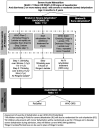Gastroenteritis Rehydration Of children with Severe Acute Malnutrition (GASTROSAM): A Phase II Randomised Controlled trial: Trial Protocol
- PMID: 34286105
- PMCID: PMC8276193
- DOI: 10.12688/wellcomeopenres.16885.2
Gastroenteritis Rehydration Of children with Severe Acute Malnutrition (GASTROSAM): A Phase II Randomised Controlled trial: Trial Protocol
Abstract
Background: Children hospitalised with severe acute malnutrition (SAM) are frequently complicated (>50%) by diarrhoea ( ≥3 watery stools/day) which is accompanied by poor outcomes. Rehydration guidelines for SAM are exceptionally conservative and controversial, based upon expert opinion. The guidelines only permit use of intravenous fluids for cases with advanced shock and exclusive use of low sodium intravenous and oral rehydration solutions (ORS) for fear of fluid and/or sodium overload. Children managed in accordance to these guidelines have a very high mortality. The proposed GASTROSAM trial will reappraise current recommendations with mortality as the primary outcome. We hypothesize that liberal rehydration strategies for both intravenous and oral rehydration in SAM children with diarrhoea may reduce adverse outcomes.
Methods: An open Phase II trial, with a partial factorial design, enrolling children in Uganda, Kenya, Nigeria and Niger aged 6 months to 12 years with SAM hospitalised with gastroenteritis (>3 loose stools/day) and signs of moderate and severe dehydration. In Stratum A (severe dehydration) children will be randomised (1:1:2) to WHO plan C (100mls/kg Ringers Lactate (RL) with intravenous rehydration (IV) given over 3-6 hours according to age including boluses for shock), slow rehydration (100 mls/kg RL over 8 hours (no boluses)) or WHO SAM rehydration regime (ORS only (boluses for shock (standard of care)). Stratum B incorporates all children with moderate dehydration and severe dehydration post-intravenous rehydration and compares (1:1 ratio) standard WHO ORS given for non-SAM (experimental) versus WHO SAM-recommended low-sodium ReSoMal. The primary outcome for intravenous rehydration is mortality to 96 hours and for oral rehydration a change in sodium levels at 24 hours post-randomisation. Secondary outcomes include measures assessing safety (evidence of pulmonary oedema or heart failure); change in sodium from post-iv levels for those in Stratum A; perturbations of electrolyte abnormalities (severe hyponatraemia <125 mmols/L or hypokalaemia.
Discussion: If the trial shows that rehydration strategies for non-malnourished children are safe and improve mortality in SAM this could prompt revisions to the current treatment recommendations or may prompt future Phase III trials.
Keywords: African Children; Dehydration; Gastroenteritis; Intravenous fluids; Rehydration; Severe Malnutrition; WHO guidelines.
Copyright: © 2024 Olupot-Olupot P et al.
Conflict of interest statement
No competing interests were disclosed.
References
-
- Kotloff KL, Nataro JP, Blackwelder WC, et al. : Burden and aetiology of diarrhoeal disease in infants and young children in developing countries (the Global Enteric Multicenter Study, GEMS): a prospective, case-control study. Lancet. 2013;382(9888):209–222. 10.1016/S0140-6736(13)60844-2 - DOI - PubMed
-
- Guideline: Updates on the management of severe acute malnutrition in infants and children. In: Edited by Organization WH. Geneva WHO;2013. - PubMed
Grants and funding
LinkOut - more resources
Full Text Sources


